Random Acts of Kindness for Animals: Helping Our Furry Friends
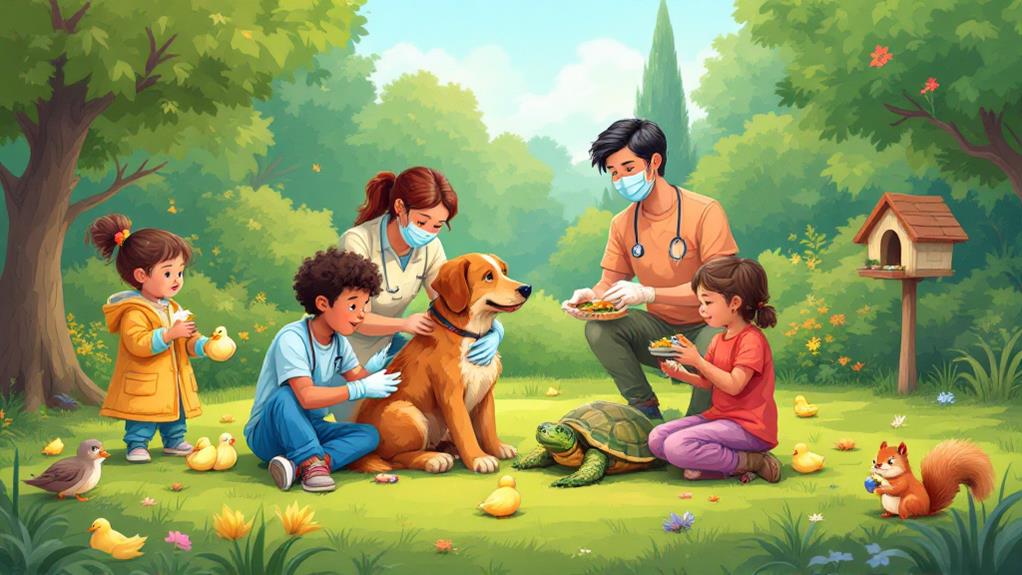
Random acts of kindness for animals extend beyond your own pets. You can dedicate extra playtime, provide homemade treats, or offer relaxing massages to your furry companions. When out and about, always dispose of pet waste properly and keep litter off the streets. Consider offering pet-sitting services or donating supplies to local shelters. Help stray animals by providing food, water, and contacting rescue organizations. Keep pet essentials in your car for emergencies, and think about housing shelter pets. By volunteering at animal shelters, you'll make a significant impact on the lives of countless animals. These simple actions can create a world of difference for our animal friends.
Treat Your Pet
When it comes to treating your pet, small gestures can make a big difference. Your furry companion deserves extra love and attention, and there are numerous ways to show them how much you care. Start by dedicating an additional 10 minutes of playtime to your pet, allowing them to bask in your undivided attention. This simple act can strengthen your bond and provide much-needed mental stimulation for your animal friend.
For a change of pace, surprise your pet with a trip to the beach. The new sights, sounds, and smells will invigorate their senses and create lasting memories for both of you. Back at home, spoil your pet with homemade, nutritious treats. These personalized snacks not only show your love but also promote your pet's health and well-being.
Engage in quality time through activities like training or grooming. These interactions cultivate trust and reinforce positive behaviors. Finally, pamper your pet with a relaxing massage, showing them affection through touch. By incorporating these acts of kindness into your routine, you'll create a happier, healthier environment for your beloved animal companion.
Pick Up Pet Poop
You might not think of picking up pet poop as an act of kindness, but it's one of the most important things you can do for animals and your community. By cleaning up after your pet, you're not only maintaining the cleanliness of your neighborhood but also preventing the spread of diseases between animals. This simple act demonstrates responsibility and sets a positive example for others to follow.
When you dispose of pet waste properly, you're contributing to a more sanitary environment and protecting water-dwelling creatures from harm. It's a small gesture that goes a long way in creating a healthier, safer, and more enjoyable space for both people and animals. By discouraging the growth of harmful bacteria, you're actively promoting proper waste disposal habits in your community.
Throw Litter in the Right Place
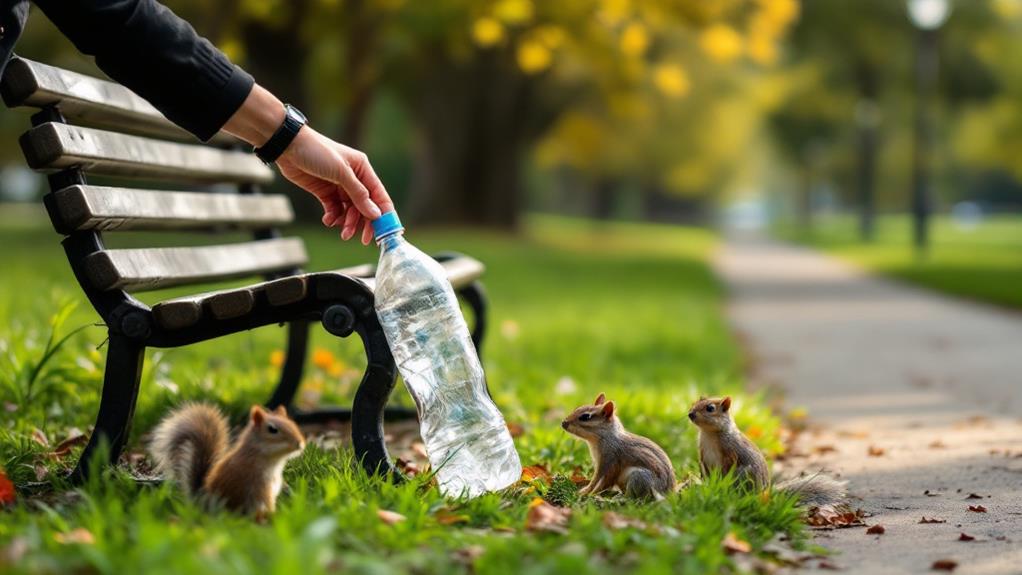
Another simple yet impactful act of kindness for animals involves proper litter disposal. When you throw litter in the right place, you're not just keeping your community clean; you're actively protecting wildlife and stray animals from harm. Many creatures can become entangled in or ingest improperly discarded waste, leading to injury or even death. By using proper receptacles, you're preventing these tragic outcomes and ensuring that animals don't suffer needlessly.
Your responsible actions also help prevent the spread of harmful bacteria that can contaminate water sources and cause disease among animals. This is particularly vital for water-dwelling creatures who may be affected by littered items in their habitat. By maintaining a litter-free environment, you're creating a healthier space for all animals in your community.
Offer to Pet Sit
Offering to pet sit is a wonderful way to show kindness to both animals and their owners. As a Random Act of Kindness, pet sitting provides a trusted caregiver for pets when their owners are away, ensuring their needs are met and offering peace of mind to the pet parent. By volunteering your time, you're not only helping the animal but also supporting fellow pet owners who might otherwise struggle to find reliable care.
When you pet sit, you'll develop a stronger bond with the animal and contribute to its well-being and happiness. This act of compassion can prevent potential neglect or abandonment due to a lack of resources. Make sure to communicate clearly with the pet owner about the animal's routines, dietary needs, and any medical requirements.
If you're looking to expand your impact, consider offering to pet sit on a regular basis. You can even Volunteer at your local animal shelter or animal control center to help care for pets awaiting adoption. By providing this meaningful service, you're helping to relieve the burden on local shelters and rescue organizations, making a positive difference in the lives of animals in your community.
Buy Extra Pet Supplies
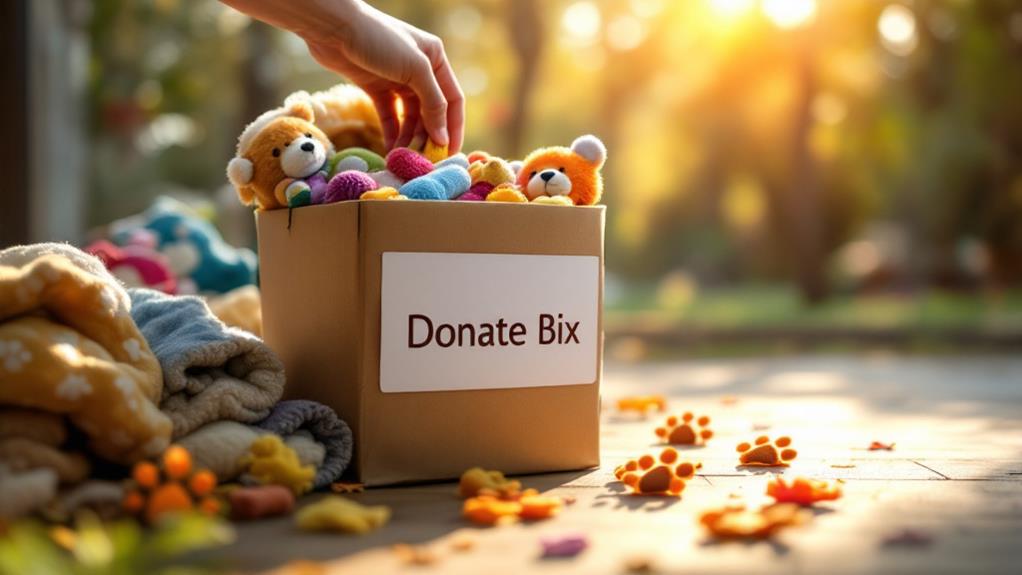
A simple trip to the pet store can become an act of kindness for animals in need. When you're shopping for your own furry friend, consider picking up a few extra items to help other pets and their owners who may be struggling. By purchasing additional pet food, toys, beds, or other supplies, you're creating a ripple effect of compassion that extends beyond your own home.
You can donate these extra supplies to local animal shelters and rescue organizations, ensuring that homeless pets receive proper care and nourishment. Alternatively, you might offer them to pet owners in your community who are facing financial difficulties, helping them provide for their beloved companions.
Keep a spare bag of pet food or box of treats in your car, so you're always prepared to help a stray animal you encounter. If you're looking to save money while making a difference, consider buying supplies in bulk and splitting them with other pet owners. Don't forget that gently used items can also make a difference – donate them to thrift stores or pet charities, giving these items a second life and benefiting animals in need.
Help a Stray Animal
Compassion in action often begins with a simple gesture. When you encounter a stray animal, you have the power to make a significant difference in its life. Start by offering the animal food, water, and temporary shelter if possible. Next, contact local animal rescue organizations to report the stray and seek guidance on providing necessary care.
If you can safely contain the animal, consider taking it to a veterinarian to check for a microchip and assess its health. Remember to familiarize yourself with your state's laws regarding stray animals and follow proper procedures for handling and reporting them to authorities.
Transport the animal to a no-kill shelter where it can receive proper medical attention and be placed for adoption. By doing so, you're not only helping the individual animal but also contributing to the reduction of homeless pets in your community.
Raise awareness about the importance of assisting strays and encourage others to take action. Remember to respect the PRIVACY POLICY of any organization you contact and be mindful of the animal's well-being throughout the process. Your kindness can alter a stray's life and inspire others to do the same.
Carry Pet Essentials in Car
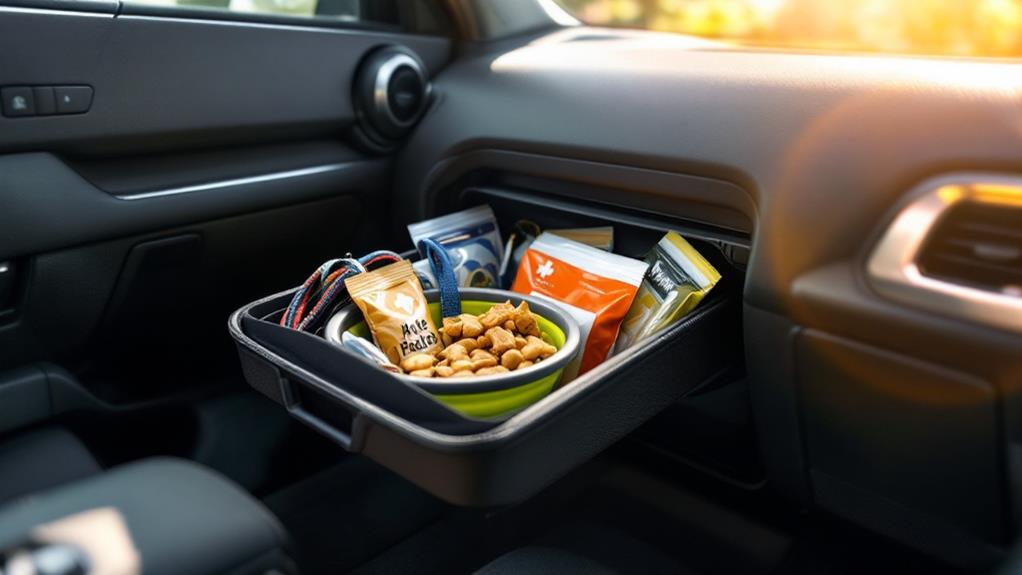
While helping stray animals is commendable, you can extend your impact by being prepared for unexpected animal encounters on the road. Carrying pet essentials in your car is a simple yet effective way to practice emergency preparedness for animals in need.
Keep a dedicated bag in your vehicle stocked with pet food, water, and basic first aid supplies. This allows you to provide immediate assistance to stray or injured animals you may come across during your travels. Include a collapsible pet bowl, towels, and treats to offer refreshment and comfort to lost or abandoned pets.
Don't forget to include a pet carrier or crate in your car. This essential item enables you to safely transport rescued animals to a shelter or veterinarian if necessary. By having these supplies readily available, you're demonstrating your readiness to respond quickly to animal emergencies.
This act of preparedness goes beyond just having supplies on hand. It shows your commitment to animal welfare and your willingness to take action when needed. With these essentials in your car, you'll be ready to offer a helping hand to our furry friends at a moment's notice.
Foster a Shelter Pet
Caring for a shelter pet offers a unique opportunity to make a significant difference in an animal's life. When you become a temporary caregiver for a shelter animal, you're providing a safe haven and nurturing environment for pets awaiting their forever homes. This act of kindness not only benefits the animal but also helps alleviate overcrowding in shelters and creates space for more rescues in need.
As a foster caregiver, you'll play an essential role in socializing and rehabilitating these animals, improving their chances of finding permanent families. Shelters provide support and resources to make sure you're well-equipped to care for your foster pet, including medical attention and adoption preparation.
Three key reasons to become a temporary caregiver:
- You'll save lives by providing a temporary home for animals in need.
- You'll help pets develop social skills and trust, making them more adoptable.
- You'll make a direct impact on your local community's homeless animal population.
Volunteer at Animal Shelters
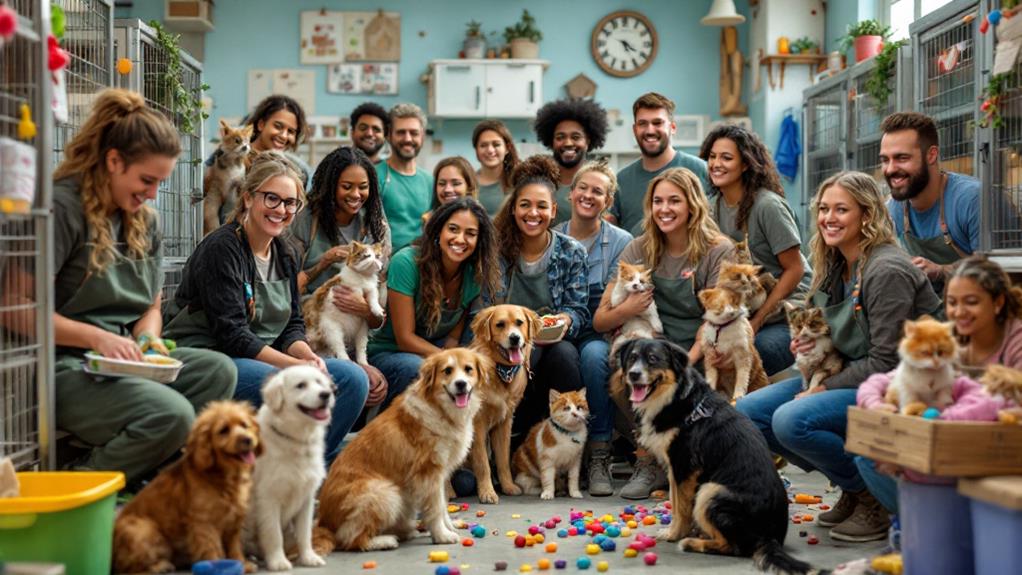
Volunteering at animal shelters is a powerful way to make a difference in the lives of homeless pets. Shelter volunteer opportunities are diverse and impactful, allowing you to directly contribute to the well-being of animals in need. As a volunteer, you'll have the chance to walk dogs, play with cats, clean kennels, and assist with grooming. These activities not only improve the animals' quality of life but also help socialize them, making them more adoptable.
One of the most rewarding aspects of volunteering is working with timid or fearful animals. By spending time with these pets, you can help them build confidence and trust, increasing their chances of finding forever homes. Many shelters offer training programs for volunteers, ensuring you're well-equipped to provide the best possible care while keeping both yourself and the animals safe.




